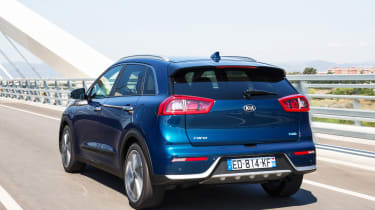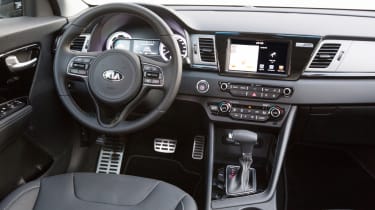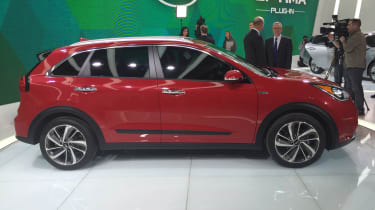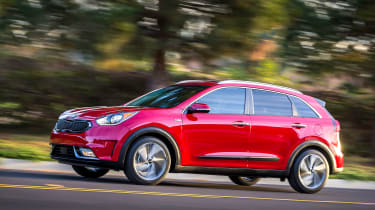New Kia Niro hybrid on sale now from £21,295
Kia's first petrol-electric crossover is available to order now, and promises up to 74.3mpg
Kia has opened UK order books for its new Niro: a hybrid crossover that aims to usurp the Toyota Prius. The Niro starts from £21,295, with four spec variants available at launch.
The new Kia Niro gives birth to another car industry acronym: the hybrid utility vehicle or HUV. Although the all-conquering Prius is never mentioned by the Korean brand, it’s clear this is still the car in Kia’s crosshairs – and it’s tackling it by packaging its new hybrid-only model in a more appealing crossover body.
The Niro is a massively important car for Kia, part of a plan to triple the number of eco-friendly models by 2020 and head towards a total of 22 ‘green’ models for Kia and it’s sister brand Hyundai by that time.
• Best hybrid cars on sale now
Under what is, in the flesh, an unexciting yet inoffensive and reasonably slippery (drag co-efficient of 0.29) skin, is a new platform especially developed for hybrid tech. It’s the same technology that’s also put to good use in the new Hyundai Ioniq.
It’ll get more use, too, with cars like the next generation Kia Soul likely to come as a full EV or hybrid. There’s also likely to be a plug-in hybrid version of next year’s Nissan Juke-rivalling SUV, while a plug-in version of the impressive new Optima saloon will debut later.
Just how green is the new Kia Niro?
The Niro’s headline figures of 88g/km and 74.3mpg may be some way off the new Prius’ 70g/km and 94mpg, but then the Kia's crossover style has to come at some expense. At £21,295, it is £2,000 cheaper than its Japanese rival, too.
That price gets you entry-level '1' spec, which comes with cruise control, a DAB radio, Bluetooth and Android Auto connectivity, plus safety tech like lane keeping assist. '2' adds a 7-inch touchscreen sat-nav, a reversing camera, part-leather trim, parking sensors, auto wipers and electric folding mirrors with LED indicators. For all that you'll pay a £1,500 premium.
Move up to '3' spec and you'll gain 18-inch alloys (which play a part in harming official economy - down to 64.2mpg and CO2 emissions of 101g/km), plus an improved 8-inch touchscreen, a wireless phone charger, a premium sound system, leather, heated seats and wheel, and electric driver's seat adjustment. Limited-run First Edition adds to that kit such as autonomous braking, blind-spot detection, heated rear zeats and cooled front seats, plus an electric sunroof, but it does ask for £26,995.
• Kia Niro prototype first drive review
The powertrain tech underneath is thoroughly modern. The Niro uses the very latest Lithium-Ion Polymer battery that is both compact and powerful – so much so that Kia has been able to do away with a 12v battery in the car. It lives under the rear seat so there’s no compromise on boot space and rear room.
Kia has also developed its Predictive Energy Control system to use navigation data to predict changes to the road ahead (including hills) to maximise the efficiency of the hybrid system.
Kia Niro hybrid system in detail
That hybrid system comprises an all-new, super-efficient 1.6-litre four-cylinder engine that produces 104bhp. As well as being thermally very effective, it also uses exhaust gases to speed the warm-up process, improving efficiency in the early stages of a drive. A 43.5bhp electric motor is mounted on the transmission for a total combined power output of 139bhp with 265Nm of torque.
The power goes through a new six-speed dual clutch gearbox, which Kia claims gives a more connected driving experience than other hybrids with CVT continuously variable transmissions (like the Prius).
Regenerative braking is used to send power back to the battery, but Kia says it’s paid special attention to brake feel, reducing the grabby nature of the brakes in other (still not named) hybrids.
Lots of work has gone into making the car as quiet as possible, too, using special glass, foams in the bodywork and specially shaped door mirrors to reduce noise. There’s even a damper in the steering system to reduce the vibration the driver might feel.
The compact battery and lack of a 12v power pack help to reduce weight, as do special lightweight seats and aluminium used for the bonnet, boot and suspension parts. However, there's still the usual roster of active and passive safety tech, plus a wide range of connectivity systems.
As with the Hyundai Ioniq, a plug-in hybrid version of the Niro is a possibility, but not for a while – certainly some time after the arrival of the hybrid version, which Kia hopes to have in UK showrooms in time for the September plate change.
However, the brand’s first plug-in, the Optima, should arrive at around the same time with a claimed range of around 600 miles, 27 of which can be completed in full EV mode. It’ll feature tweaked aerodynamics to give it a class best drag coefficient of 0.24cd and it’ll come in one well-equipped trim level expected to cost around £30,000.
What do you think of the Kia Niro? Let us know in the comments section below...
Find a car with the experts







